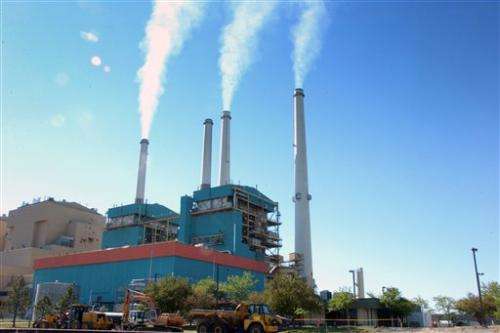US justices rap agency, but uphold warming rules

The U.S. Supreme Court largely left intact Monday the Obama administration's only existing program to limit power plant and factory emissions of the gases blamed for global warming. But a divided court also rebuked environmental regulators for taking too much authority into their own hands without congressional approval.
The justices said in a 5-4 vote along ideological lines that the Environmental Protection Agency cannot apply a permitting provision of the Clean Air Act to new and expanded power plants, refineries and factories solely because they emit greenhouse gases.
The decision underscores the limits of using the Clean Air Act to deal with greenhouse gases and the administration's inability to get climate change legislation through Congress.
"The Supreme Court put EPA on a leash but not in a noose," said Michael Gerrard, director of Columbia University's Center for Climate Change Law.
"It reaffirmed that EPA can regulate greenhouse gases, but it can only go so far in reinterpreting the statute," Gerrard said. "The court invalidated a small corner of a secondary program. The main event—EPA's proposed rules on existing power plants—remains to be fought another day."
The EPA and many environmental advocates said the ruling would not affect the agency's proposals for first-time national standards for new and existing power plants. The most recent proposal aims at a 30 percent reduction in greenhouse gas emissions from existing power plants by 2030, but won't take effect for at least another two years.
The justices warned that the regulation of greenhouse gases is not automatic under every program of the Clean Air Act as the administration had assumed it was. Similar logic is driving the EPA's other actions on global-warming pollution.
Justice Antonin Scalia, writing for his conservative colleagues, said EPA could not "just rewrite the statute" to bring greenhouse gases under a provision dealing with expanded and new facilities that would increase the overall amount of air pollution. Under the program, companies must evaluate ways to reduce carbon dioxide emissions in order to get a permit to build. Carbon dioxide is the chief gas linked to global warming.
But by a wider, 7-2 margin, the court preserved EPA's authority over facilities that already emit pollutants that the agency regulates, other than greenhouse gases.
"EPA is getting almost everything it wanted in this case," Scalia said. He said the agency wanted to regulate 86 percent of all greenhouse gases emitted from plants nationwide, and it will it be able to regulate 83 percent of the emissions under the ruling. Justices Samuel Alito and Clarence Thomas said they would go farther and bar all regulation of greenhouse gases under the permitting program.
The EPA called the decision "a win for our efforts to reduce carbon pollution because it allows EPA, states and other permitting authorities to continue to require carbon pollution limits in permits for the largest pollution sources."
The agency said that, as of late March, 166 permits have been issued by state and federal regulators since 2011.
Permits have been issued to power plants, but also to plants that produce chemicals, cement, iron and steel, fertilizer, ceramics and ethanol. Oil refineries and municipal landfills also have obtained greenhouse gas permits since 2011, EPA said.
Under Monday's ruling, the EPA can continue to require permits for greenhouse gas emissions for those facilities that already have to obtain permits because they emit other pollutants that the government has long regulated.
The program at issue is the first piece of the EPA's attempt to reduce carbon output from large sources of pollution.
The utility industry, the U.S. Chamber of Commerce and 13 states led by Texas had asked the court to rule that the EPA overstepped its authority by trying to regulate greenhouse gas emissions through the permitting program. The administration failed to get climate change legislation through Congress.
In 2012, a three-judge panel of the U.S. Court of Appeals for the District of Columbia Circuit concluded that the EPA was "unambiguously correct" in using existing federal law to address global warming.
The agency's authority came from the high court's 2007 ruling in Massachusetts v. EPA, which said the Clean Air Act gives EPA power to limit emissions of greenhouse gases from vehicles.
Two years later, with Obama in office, the EPA concluded that the release of carbon dioxide and other heat-trapping gases endangered human health and welfare. The administration used that finding to extend its regulatory reach beyond automobiles and develop national standards for large stationary sources. Of those, electric plants are the largest source of emissions.
When the Supreme Court considered the appeals in October, the justices declined requests to consider overruling the court's 2007 decision, review the EPA's conclusion about the health effects of greenhouse gas emissions or question limits on vehicle emissions.
© 2014 The Associated Press. All rights reserved.


















